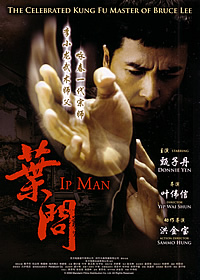SYNOPSIS:
In the 1930s, Wing Chun master Ip Man is a prosperous man. However his prosperity does not last long when the Sino-Japanese war breaks out. The Japanese army seizes Ip Man's family house, forcing him together with his wife and son to seek refuge in a derelict house. To make ends meet, Ip Man chooses to work as a coolie.
A wushu enthusiast, General Miura who leads the Japanese troop cause the death of two of Ip Man's friends. After a chanced encounter with Ip Msn, General Miura is impressed with Ip Man's wushu skills and challenges him to a fight. To win back the dignity of the Chinese, Ip Man agrees to this potentially fatal challenge...
MOVIE REVIEW:
There are Kungfu flicks and there are wire-fu flicks. The definition for wire-fu flicks would be those martial art movies where the performers are seemly not bound by gravity laws and the artists to perform those incredible marital arts feat are pretty obvious usage of wireworks. In recent years, Kungfu movies are reemerging in popularity again and sadly, most of them are generally wire-fu flicks, with very little actual Kungfu to be impressed with (even Jet Li and Jackie Chan’s films are filled with them).
Ip Man on the other hand, marks the return of good o’ organic Kungfu flick. The grounded no frill presentation of Wing Chun (Southern Chinese Martial Arts) felt real and truly awesome. That’s not to say that there aren’t any apparent wireworks in Ip Man but the usage felt like secondary and for supporting purposes. The focus and obvious highlight here are the simultaneous rapid punches that Donnie Yen dishes out to the challengers as the grand master Ip Man and that’s something wires could not achieve.
Much of the credits have to be given to Donnie Yen, action choreographer Sammo Hung and his crew. The punches here look like a frenzy blitz but yet all of them felt real and painfully possible. The style of Wing Chun stood out from the various fighting manners that had been seen in other movies. Although the cast here stay grounded (as oppose the floaters in Crouching Tiger Hidden Dragon), the fluidity of the Kungfu could be seen and felt in all it’s blazing glories. Every punch felt connected and it really felt that the actors (specially Mr. Yen) are showing real Kungfu in furry fast manner but still remains in detectable martial arts steps.
Although the action sequences are the primary reason to watch Ip Man for, it’s surprising to say that story wise, it wasn’t as bad as what had been foretold to us. While it isn’t spectacular, it had a decent plot to move Ip Man from one fighting situation to another. It also builds a respectable rep for Ip Man by showing how he conduct himself and handled problematic circumstances.
The exaggerated bits on the events that happened to the actual Ip Man felt a bit over the top. It’s understandable that the movie had to make it more cinematic and exciting but it made one wonder could the conflict between Ip Man and the Japanese invaders be resolved so easily.
However the Japanese invasion elements were a nice touch to tie with the classic Bruce Lee’s Fist of Fury which had the similar standoff with the Japanese. The linkage here would be that since Ip Man happened to be Bruce Lee’s teacher for a period of time, this movie could be saying indiscreetly that Mr. Lee was in a way inspired by his teacher’s exploits and used it for his classic Fist of Fury. A little shameless in tagging one’s movie with the classic movie but the innovation for such linkage deserved my thumb up.
It’s unlikely another film that could match Ip Man’s amazing display of martial arts in this year or even until the sequel. Sammo Hung and Donnie Yen had managed to find something new to dazzle after the Kungfu movie scene seems to be retreading itself in recent years. Kudos to them and hope they will outdo themselves in the next film.
SPECIAL
FEATURES:
This Code 3 DVD contains no bonus features.
AUDIO/VISUAL:
There isn’t any jarring pixilation problem during the frenzy action sequences to note and overall a fine presentation of this movie.
MOVIE RATING:
   
DVD
RATING:

Review by Richard Lim Jr
|


